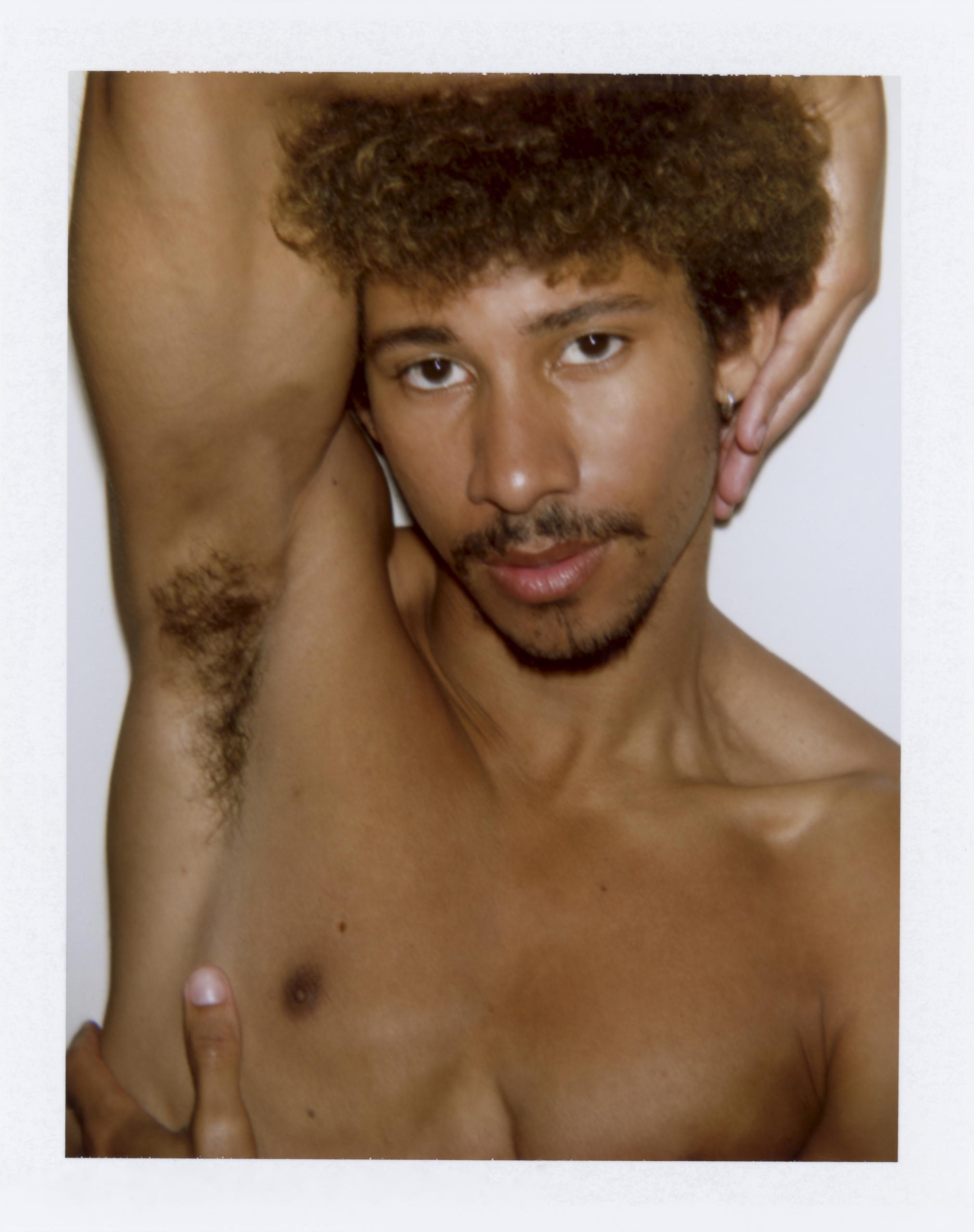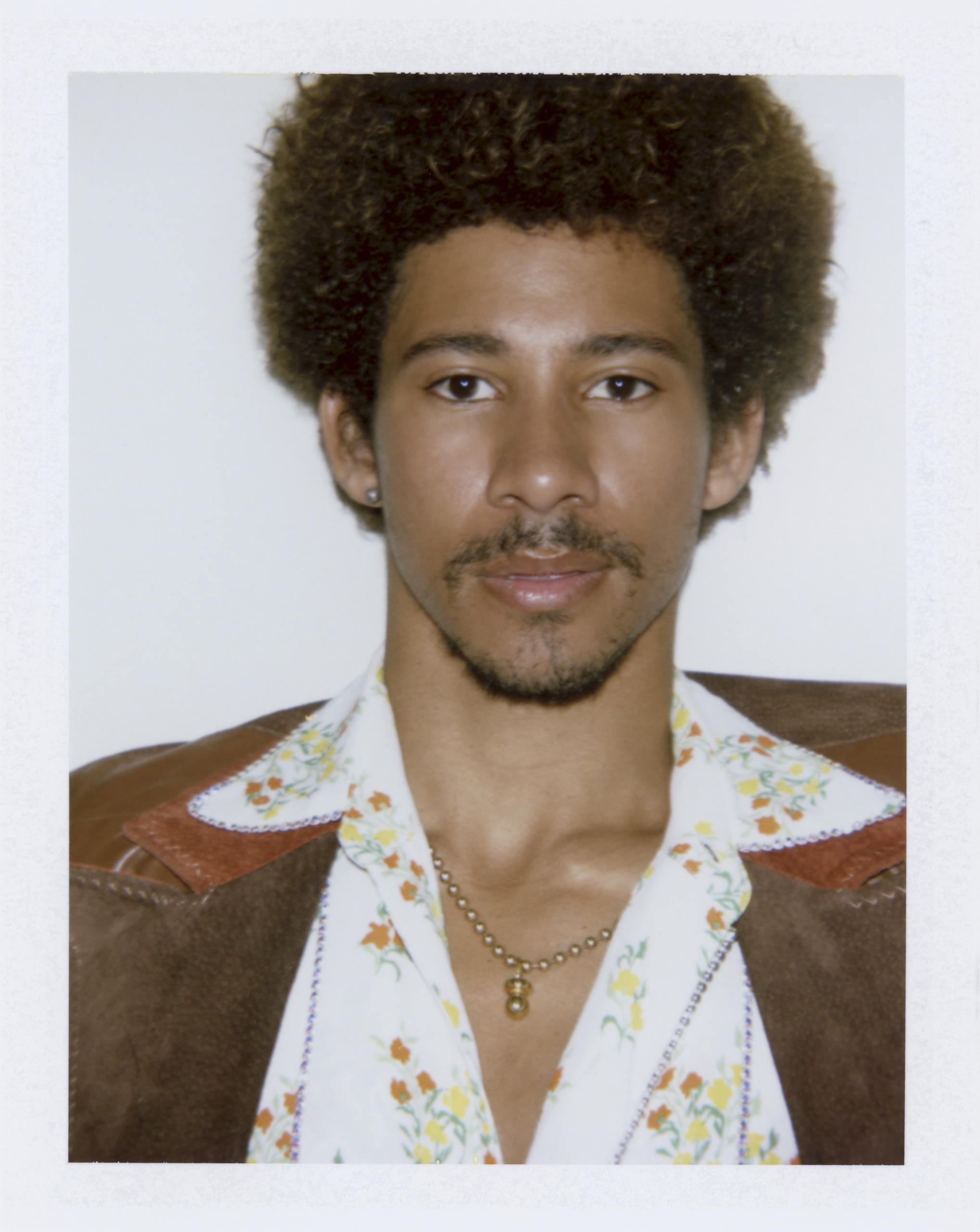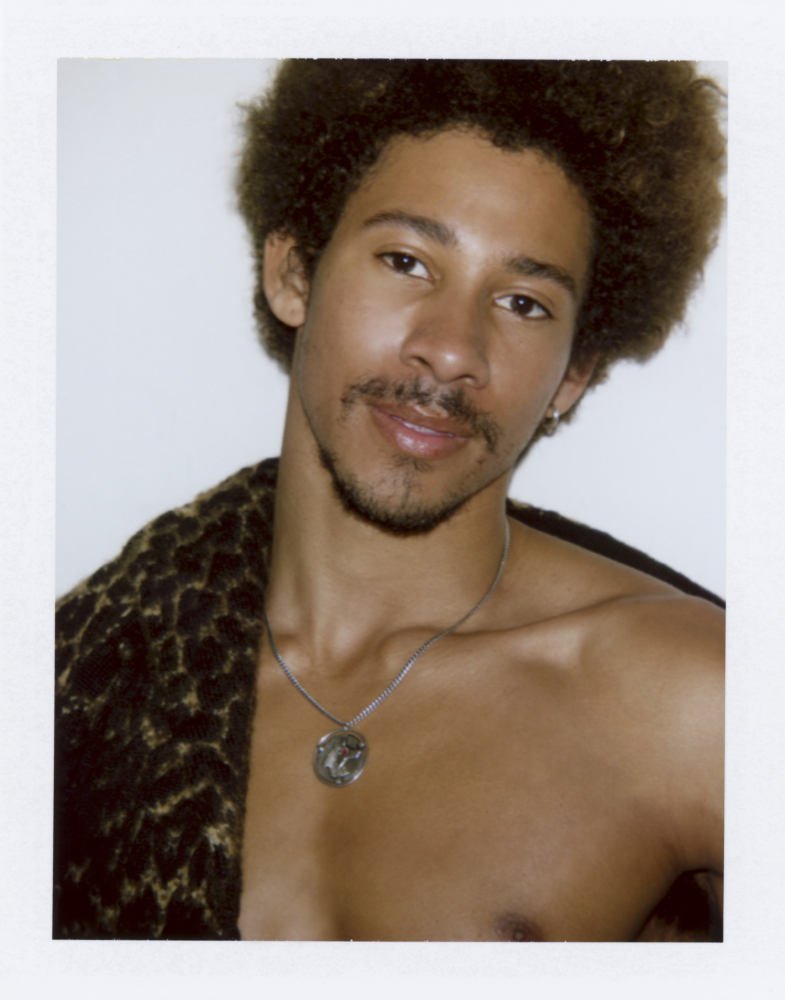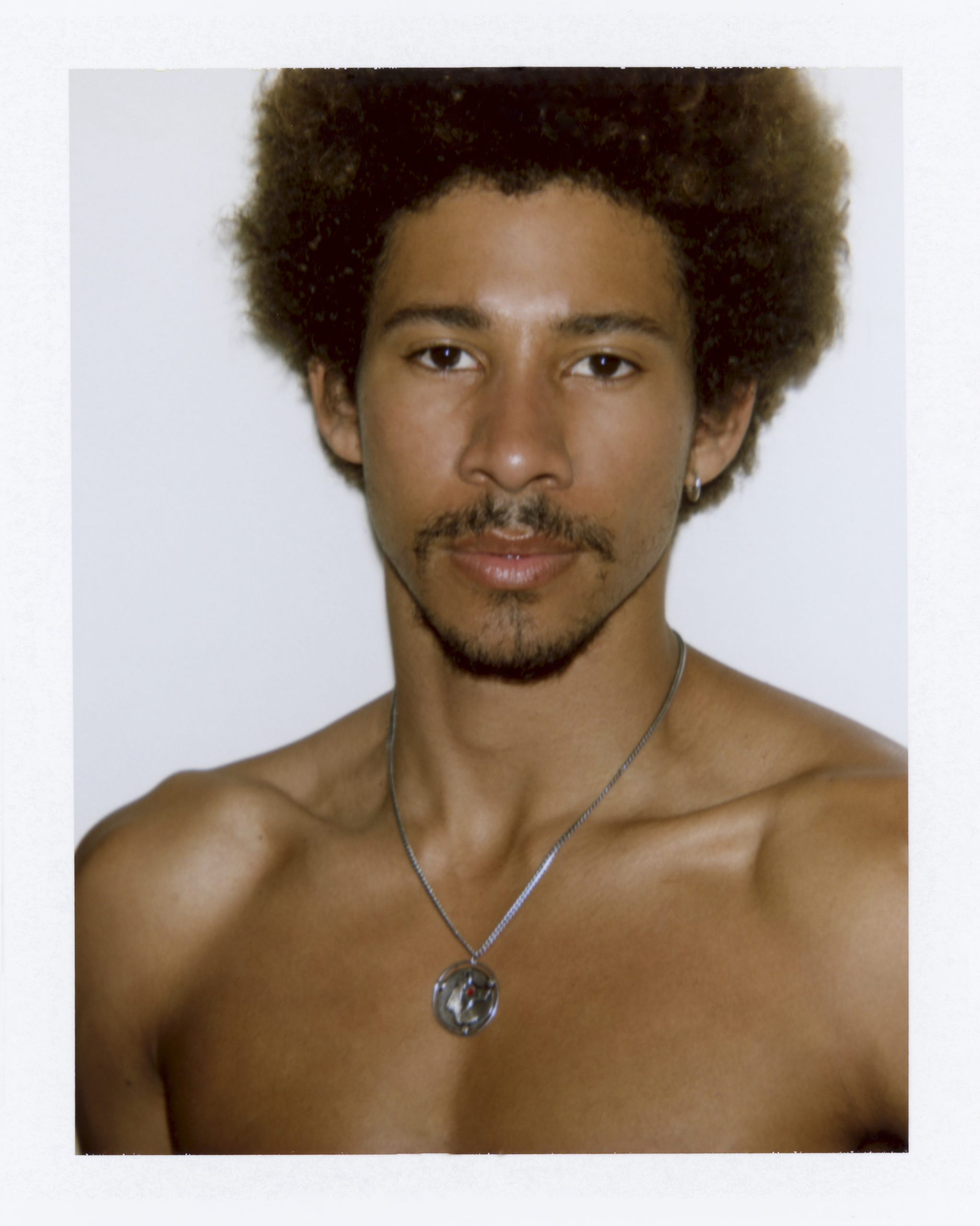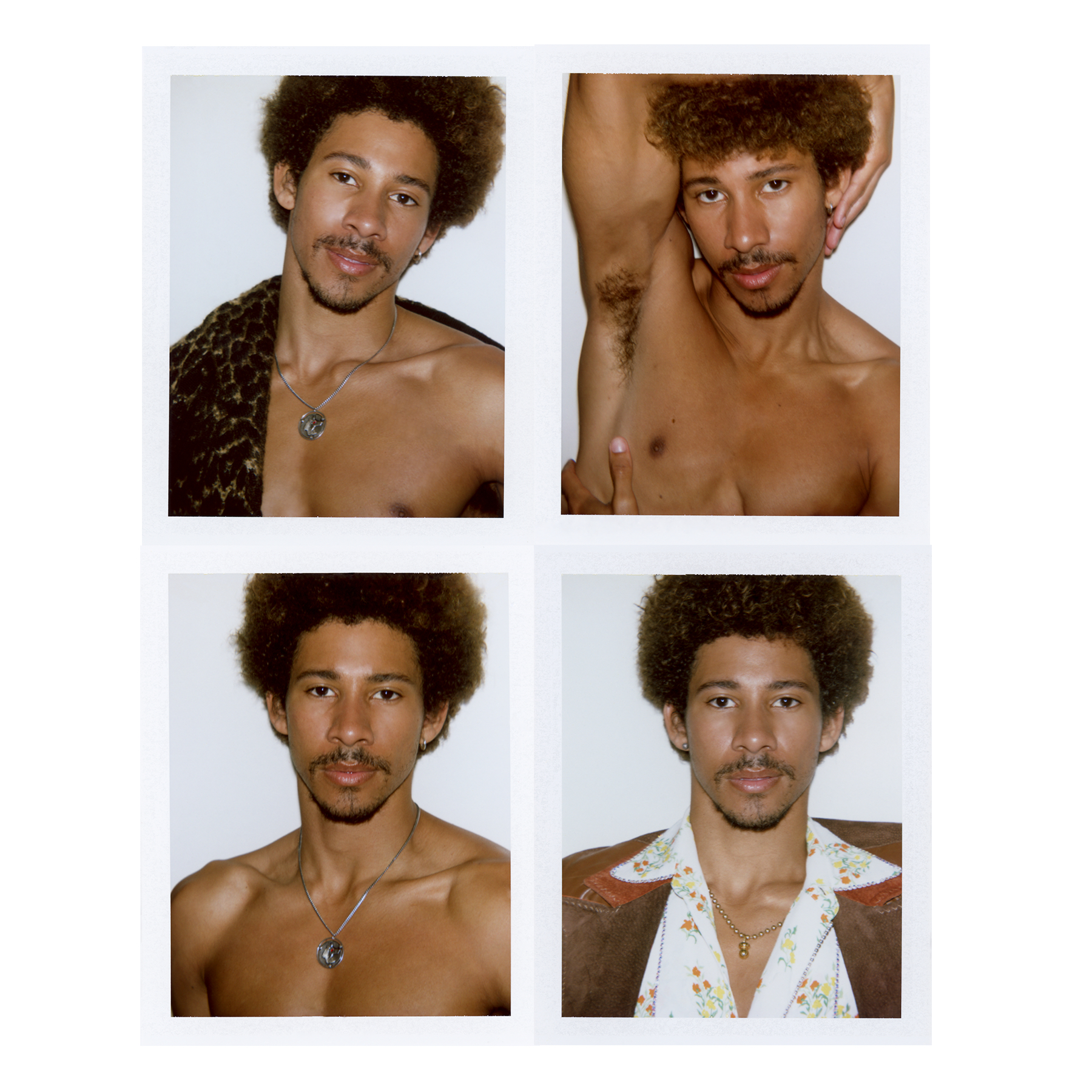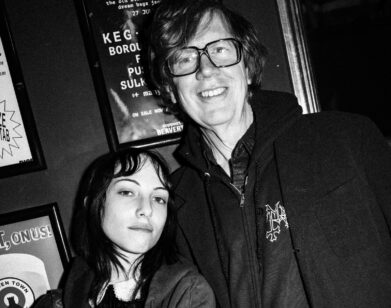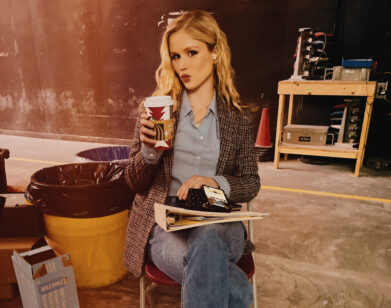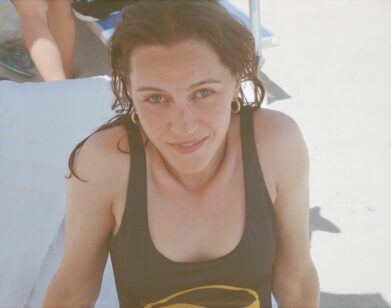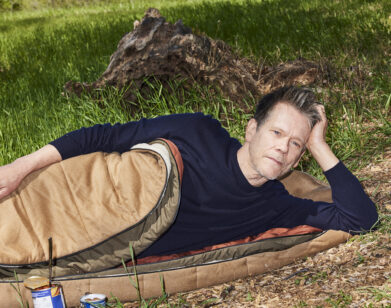What Is Magic? Keiynan Lonsdale and Jacob Collier Look to Art for Answers
“Oh wouldn’t that be neat, a world in which you and I, we’re free,” sings Keiynan Lonsdale on “We Are the Children.” The song opens Rainbow Boy, the 28-year-old Australian entertainer’s debut album, a project that helped him find the very freedom he sings about. Lonsdale is perhaps best known for his crush-worthy character in the queer coming-of-age story, Love, Simon. Comic book enthusiasts might recognize him as a superhero on the CW’s The Flash. Fans of fashion might remember when Lonsdale proudly tore up the 2019 MET Gala pink carpet in a gown embellished with over a thousand handmade butterflies. But with Rainbow Boy, Lonsdale has firmly planted his flag in the music world, with a kaleidoscopic examination of masculinity, identity, and queerness. “Rainbow boy is a character I created,” Lonsdale tells the musician Jacob Collier from his home in Los Angeles. “His best part is that he believes in magic, that’s really it.” He wants to share that with as many people as possible.” Lonsdale and Collier connected last week for a wide-ranging conversation about creation, identity, and, yeah, magic.
———
JACOB COLLIER: It’s so wonderful to meet you.
KEIYNAN LONSDALE: Thank you so much for doing this. I’m a massive fan.
COLLIER: The pleasure is completely and utterly mine.
LONSDALE: The album just came out, and this feels like a birthday gift.
COLLIER: Congratulations. It’s probably been quite some time in the works, right?
LONSDALE: I started writing it two years ago. I went into the project with about 10 songs, thinking that they were going to go on the album, and then within the first week of writing, I knew that the project was going somewhere else. I feel like I’ve been trying to make this, in some way, my whole life.
COLLIER: Isn’t it a weird feeling when your idea begins to change whilst it’s being born?
LONSDALE: You can either embrace it or resist it. When you embrace it, it becomes this amazing thing. Even then, I think there are times when the idea became bigger than I expected. I was worried that it was getting away from me. I was like, “I’m going to have to put in a lot more work than I thought, because this is growing in a way that I wasn’t really prepared for.” Is that how you felt with your Djesse series of albums? It’s in four parts. Were you always planning it to be these four worlds?
COLLIER: The whole Djesse project is, like, the paramount example of something that has evolved alongside me creating it. It started as one album, and then I realized that I had too many ideas for just one album. I realized that a story isn’t complete without a conclusion. I think it’s quite a privilege to grow alongside something that’s teaching you so much about yourself.
LONSDALE: I thought I knew myself quite well. That’s why I was writing the album. I was kind of being cocky. I was like, “Yeah, this is how I feel. I’m going to put myself into this.” I didn’t realize how much it would force me to grow, and challenge me, and that it would be such a ride. You become one with the project in many ways.
COLLIER: Your album is 14 songs long, and I suppose that’s bigger than it was originally intended to be, right?
LONSDALE: I think it was always going to be around that number. I didn’t really have a set plan, it’s just that I had been recording for so long and I already had songs that I was in love with. I work with an amazing producer and artist named Louis Futon, who produced the whole project. Once that first song was done, we were like, “Let’s just start completely fresh, because something new is totally happening. Let’s not make any rules. Let’s just play.” I’ve always been told that I needed to find a sound or find my thing, and I was like, “Perhaps I can just play with all the colors that I enjoy and see what happens.”
COLLIER: It’s funny you’re saying those words, because that’s exactly how I think about it, too. Riddle me this, because I know that you come from a world of acting, which I suppose is a very different creative discipline in some ways, and maybe similar in others. How much have you learned from that process, and how comfortable have you found the entire thing?
LONSDALE: Rainbow Boy is a character that I created, but when that whole project was born, I didn’t really think of him as a character. I kind of felt like I had become Rainbow Boy. That’s probably the actor in me. It might sound funny, but once I had finished writing the last song, called “Mirror,” I felt like that character was leaving me, and I was really sad because he was so colorful and so full of joy and wonder. He viewed everything as if viewing it for the first time, and I, basically, for two years of my adult life, was living as this character, and I thought that I was going to be him forever.
COLLIER: I love that so much. You’ve gifted the world this character, and one would think that all of these colorful elements from every shade can now exist in people’s lives, which is an amazing thing to give people. Can you explain magic to me?
LONSDALE: Magic is what dreams are made of. I believe that, as human beings, we’re a part of something very special. Life is special—not easy and not simple, but special. I think that the more layers that we can strip back, the closer we’ll get to a true essence of who we are and what we’re a part of. Life is magic, nature is magic, music is magic. Connection, love—that’s all magic.
COLLIER: I think of music as a similar kind of alchemic magic. And, for me, that has immense power. It can remind me who I am, even when I forget when all of the magic in my life is gone. Sometimes listening to things I’ve made, or just the act of creation itself, brings that magic back. I suppose for me, with Djesse, I realized fairly early in the process that I also needed a character to walk this path, which in some ways is me, and in some ways is not me. I think of Djesse a bit like the infinite child who can see everything and walk into everything as light as a feather and just alchemize.
LONSDALE: Rainbow Boy is the child’s self. He’s the one who hasn’t forgotten magic, and I think embodying him as an adult is that sense of remembering, and like you said, coming home to yourself.
COLLIER: It’s funny because the album was recorded basically in the room I’m currently talking to you from, which is in my family home in North London, where I’m quarantined. But it’s a funny thing to be discussing and describing the idea of home. How, where, and why does the idea of home hold gravity for you?
LONSDALE: Louis Futon and I lived together at the time of making the album, so it was recorded mostly from home, but in L.A. Originally, I’m from Australia. I’ve been away from home for quite some time. I’ve been over here for about 6 or 7 years, and while I visit, I’ve never properly spent enough time there. The journey that I’ve been on is because I do travel so much—thanks to what I’m able to do, I can explore the world. I was naturally an incredibly shy person. I never used to look people in the eye. I found it really hard to make any kind of conversation unless I was dancing on stage. So I’ve had to learn to find my home within myself so that wherever I go, wherever I walk, I’m home. The reason why I made the project is because I had come out about three years ago, and then shortly after that because I’m now living authentically and not so afraid, I felt like I had finally returned home to myself, the version of me that wasn’t here before. I tried to work so hard to change him, which we all can do in some ways.
COLLIER: I think that the journey of self to truth is always kind of a gnarly one. I find it difficult to stand up for what you are and what your essence is, and seeing that clearly can be an unbelievably hard thing to do. Obviously everybody has to do it, to a point. Listening to your album and hearing you speak, it feels like you’re operating within the kind of infinity of your fullest possible self. It’s almost like magic has entered your life in a whole new way.
LONSDALE: It certainly felt that way and feels that way whenever the magic happens. It’s also interesting because now that the project is finished, I think the second-to-last song, the last lyric is, “I think it’s time we come home,” and I had realized very recently that I just need to go home, back to Australia, and be there for quite some time.
COLLIER: I’ve never really left home. I’ve been on tours and I’ve done a heck of a lot of traveling, but I’ve never removed the anchor from here in North London, so it’s hard sometimes for me to see the idea of home without it being merged with my current reality. I think that home has a whole new power when you leave it.
LONSDALE: Because your projects are doing so well, and things are catapulting in so many great directions, do you feel that the sense of adventure has already begun?
COLLIER: I always feel most adventurous when I’m not thinking about myself, and that’s the thing that’s becoming more challenging. That process, for me, was still a massively important part of my life. It’s bizarre how things can take off and your view of the world can be transformed within even just a couple of weeks, but it’s even stranger to do that from the comfort of your childhood bedroom.
LONSDALE: I didn’t think about it like that. What do you do when you need time?
COLLIER: When I really desperately need time, time will kind of make itself for me. I’m not quite sure how it works, but I think that there’s some kind of magic going on. When I really need something, the universe tends to step in and give it to me. For me, the idea of time is a really weird thing, because sometimes it can go real fast, and sometimes it can go real slow. I’m convinced that it can be bent. I think that the way you think about the world can bend it, and one moment of time can feel like it can last forever if you know how to think about it right. It feels more and more like being a child, and imitating the way a child is in the world feels like the highest attainable order of wisdom.
LONSDALE: I’m always trying to relax into that space, because I know very well what it’s like to feel like, “I have to be responsible, and I need to do these adult things because now life is different.” Then I remind myself again to come back and play.
COLLIER: I’m playing this emotional accordion as an adult, because it’s like, “I’m very sensible.” “No I’m not!” “Oh, yes I am.” “No, I’m a silly boy!” “No, I’m a responsible adult.” I think that all artists have to play that accordion. The older you get, the more you have to learn how to dance that dance, but without compromising either side. It can be super hard at times.
LONSDALE: You’re right. I like to be quite safe and secure, and then the other side is where it’s just complete madness and wildness and pure imagination.
COLLIER: As an introvert myself, I can see myself so much in what you’re talking about. How do you focus your idea of identity, if at all, within the kind of extraordinary manner of shape-shifting that you’re so obviously energized by and comfortable with?
LONSDALE: I really had to spend quite a bit of time in solitude, because I can be quite impressionable. I listen a lot to what people say, so I needed to just spend more time alone figuring out what I really thought about myself, without all of the shape-shifting, and see what would come naturally from that. I return to dancing a lot, and I feel like every day I wake up and I don’t really know where I’m starting, so I allow myself the time to be this blank canvas. I don’t let someone else paint on me first. I make sure that I’m patient enough with myself to see what life is pointing out, and then it goes, “You want to use the color red right now.”
COLLIER: There are those things that let you remove all judgment from yourself. I do kind of a similar thing when I sit to play, or if I sit to write, which are two things I love to do. I always take that inward look, and I feel my way through what kind of frequencies I’m feeling. People live their whole lives waiting for that feeling where they don’t have to be judged and they don’t have to live up to somebody else’s idea of who they should be and how they should come across. I feel like you’re someone who has conquered this, which I have lot of respect for.
LONSDALE: I definitely thought I had conquered it, and that’s when I went to write the album. Through the process, I was challenged by it tenfold. We’re constantly learning, and we’re always going to be students. I do definitely look to a certain part of myself where I go, “Wow, I’ve come so far,” and that’s what I have to remind myself, but I think I do have an obsession with growth, and that sometimes can mean I don’t always reflect back.
COLLIER: I’m obsessed with gathering so much that sometimes I can forget to consolidate. I’m gradually trying to figure out ways in which I can enter that space without it feeling like I’m not being efficient or I’m not moving forward, because sometimes that space can move you forward with flying colors.
LONSDALE: As you said, life will create time for you. When I’m moving too fast, if I don’t make the call, life makes the call, and then I kind of become incapable of moving the way that I want to. That’s one thing I’ve gotten a lot better at—becoming at peace with being still. That’s always been really hard for me. Growth comes from there as well.
COLLIER: There’s an amazing British spoken word poet and musician whose name is Kate Tempest. She’s just a champion. There’s a line from a song of hers that came to mind when you were talking about making the album: “Nothing I’ve learned can prepare me for everything else that needs learning.” It really stuck with me, because I find myself expecting a lot of myself.
LONSDALE: I have something written on my whiteboard that says, “No matter the pressures, I decide the pace of this dream. I can let it flow.” Since I was a kid, I’ve been trying to get to the next thing. I’ve been trying to keep pushing and the industry is the same way, so it can be a disastrous combination. I’ve found more freedom in the music, and I get to express more of what I’m going through, and my story in general. In acting, there are pretty strict schedules, and you’re going to be in this country, and you’re shooting through these times, and you’re standing here, and everything’s sort of done for you. It’s an amazing experience, but I had too much rhythm in me—I couldn’t contain it anymore.
COLLIER: With all of this talk about control and about letting things be, and about being willing to be yourself, whatever it takes—what makes you feel safe?
LONSDALE: Chocolate. It’s the first thing that came to mind. It gives me a sense of home. It’s been a very consistent lover in my life. Actually, there’s a song on the album called “Chocolate,” and I remember waking up that day and being like, “I would love to write a song about chocolate, just because I do love it so much and I think that would be really funny.” I think chocolate represents to me a really simple pleasure and it feels like love. Sometimes it’s looking at a bunch of plants. I started surrounding myself with plants in the house, because nature is proof that life is good at the core.

